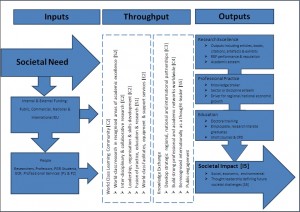Vitae, the organisation which focuses on researcher development is offering up to 40 free places on this 2 day training workshop to help you develop your collaboration skills. All you need to cover are your travel expenses to Nottingham. Places will fill up fast so if you’re interested don’t delay! The dates are 30th Jan – 1st Feb 2012.
This 2 day residential course looks at the building blocks of the collaborative style of research: inclusive communication, cultural awareness, robust planning, negotiation and the ability to work effectively with others. Whether your collaboration is with another academic in your department, or partners from different subjects, sectors and countries, it helps you to develop winning strategies for connecting and working with others.
What does it involve?
The course is attended by up to 40 researchers from across the country, from different disciplines and career stages. It is led by a team of experienced facilitators who work with participants throughout the 2 days to support their learning. They will be from a variety of backgrounds with experience in collaboration, academia and other sectors.
This course takes a ‘learning by doing’ approach. There will be presentations on collaboration theory, but for the most part, you will be actively participating in the sessions and activities. 
This is an intensive 2 day residential course which runs from dinner on the evening of Monday 30th January to 5pm on 1st February 2011
What’s in it for you?
This course offers you the opportunity to:
- explore collaboration both in theory and in practice
- work with a team of experienced facilitators from a range of career backgrounds, who will ensure you get the most out of the 2 days
- meet researchers from a variety of disciplines, backgrounds and career stages
- develop your understanding of collaboration theory and how to apply it in practice
- take a few days out from your research both physically and mentally, and have some space in which to consider yourself and your next steps
Eligibility/Entry
This event is open to all UK researchers – subject to availability. Book your place now.
Places on the event are free but participants will need to cover their own travel expenses. Accommodation and meals are provided.
 As part of Mental Health Week here at BU Dr
As part of Mental Health Week here at BU Dr  and District branch, acting as their Patron and I organise their publicity. We are working on a number of local projects, not least looking to establish closer ties between BU and the Samaritans. A number of our students volunteer to work at the Branch. The Samaritans have a presence at several BU events. We are currently working with several people at BU to establish a crisis nightline, and training (any) staff who have contact with students who may need emergency help (we have already had some crises with the current BU student intake). We are also looking to work closely with other agencies and charities locally. Some of this may lead to research opportunities, exploring ways in which mental illness, stress and despair can be reduced in our community. I am planning a number of projects focusing on suicide and mental health (including the particular problems faced in rural communities).
and District branch, acting as their Patron and I organise their publicity. We are working on a number of local projects, not least looking to establish closer ties between BU and the Samaritans. A number of our students volunteer to work at the Branch. The Samaritans have a presence at several BU events. We are currently working with several people at BU to establish a crisis nightline, and training (any) staff who have contact with students who may need emergency help (we have already had some crises with the current BU student intake). We are also looking to work closely with other agencies and charities locally. Some of this may lead to research opportunities, exploring ways in which mental illness, stress and despair can be reduced in our community. I am planning a number of projects focusing on suicide and mental health (including the particular problems faced in rural communities). I am supervising a PhD project (Research student – Lauren Kita), working with the perinatal team within Dorset HealthCare University NHS Foundation Trust. We are exploring the extent that poor sleep may pose a risk factor for postnatal depression. We will be examining sleep objectively, using state-of-the-art EEG equipment, and subjectively, using sleep diaries. Women with a history of depression will compared to women without such a history, during pregnancy and at weeks 4 and 12 after the baby is born. The mother’s mood and other mental indicators will also be measured.
I am supervising a PhD project (Research student – Lauren Kita), working with the perinatal team within Dorset HealthCare University NHS Foundation Trust. We are exploring the extent that poor sleep may pose a risk factor for postnatal depression. We will be examining sleep objectively, using state-of-the-art EEG equipment, and subjectively, using sleep diaries. Women with a history of depression will compared to women without such a history, during pregnancy and at weeks 4 and 12 after the baby is born. The mother’s mood and other mental indicators will also be measured. BU’s International Centre for Tourism and Hospitality Research (ICTHR) is delighted to be hosting the second global conference to explore real-world issues.
BU’s International Centre for Tourism and Hospitality Research (ICTHR) is delighted to be hosting the second global conference to explore real-world issues. The
The  The first closing date for the BU Research Development Fund – Small Grants Scheme (RDF-SGS) is 31 October 2011.
The first closing date for the BU Research Development Fund – Small Grants Scheme (RDF-SGS) is 31 October 2011.
 The Do’s of writing a good research bid:
The Do’s of writing a good research bid:  I am sure that you would wish to join with me in congratulating both
I am sure that you would wish to join with me in congratulating both 

 A report from ESRC funded research has found that university-community engagement is marginal to the funding, organisation, management and strategic control of universities and this means that universities are missing out on the chance to help develop ‘social capital’ in their local communities.
A report from ESRC funded research has found that university-community engagement is marginal to the funding, organisation, management and strategic control of universities and this means that universities are missing out on the chance to help develop ‘social capital’ in their local communities. 
 Dr Martin Pickard is coming to BU on 23rd and 24th November 2011 to deliver interactive workshops on the preparation of research council applications.
Dr Martin Pickard is coming to BU on 23rd and 24th November 2011 to deliver interactive workshops on the preparation of research council applications. 












 From Sustainable Research to Sustainable Research Lives: Reflections from the SPROUT Network Event
From Sustainable Research to Sustainable Research Lives: Reflections from the SPROUT Network Event REF Code of Practice consultation is open!
REF Code of Practice consultation is open! BU Leads AI-Driven Work Package in EU Horizon SUSHEAS Project
BU Leads AI-Driven Work Package in EU Horizon SUSHEAS Project ECR Funding Open Call: Research Culture & Community Grant – Apply now
ECR Funding Open Call: Research Culture & Community Grant – Apply now ECR Funding Open Call: Research Culture & Community Grant – Application Deadline Friday 12 December
ECR Funding Open Call: Research Culture & Community Grant – Application Deadline Friday 12 December MSCA Postdoctoral Fellowships 2025 Call
MSCA Postdoctoral Fellowships 2025 Call ERC Advanced Grant 2025 Webinar
ERC Advanced Grant 2025 Webinar Update on UKRO services
Update on UKRO services European research project exploring use of ‘virtual twins’ to better manage metabolic associated fatty liver disease
European research project exploring use of ‘virtual twins’ to better manage metabolic associated fatty liver disease